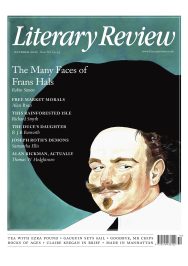Martin Pugh
Goodbye to Gladstone
The Strange Survival of Liberal Britain: Politics and Power Before the First World War
By Vernon Bogdanor
Biteback 864pp £35
In 1935, when Mussolini was dropping chemical bombs on Abyssinia and Stanley Baldwin was winning a second general election for the National Government, George Dangerfield published The Strange Death of Liberal England. He claimed that during the last years before the First World War, British parliamentary institutions and traditions were systematically undermined and the Liberal Party, though in power, was on its way to collapse in the face of the challenges posed by, among other things, the rise of a militant labour movement, the women’s suffrage campaign and burgeoning civil war between unionists and nationalists in Ireland. Remarkably, the book was still being reissued as late as the 1970s.
The explanation for its success is not hard to find. Written by a journalist, it was a lively and readily comprehensible read. All kinds of traditions, social and political, had been superseded as a result of the First World War. It was written in a period in which, all over Europe, liberal parliamentarianism was giving way to fascism on the one hand or Bolshevism on the other. It was commonly assumed across the Continent that authoritarian government represented the future. The Liberal Party, which had returned 399 MPs to Westminster in the 1906 election, by 1935 had only twenty-one MPs.
However, Dangerfield’s book has long been discredited. It was a popular sketch, it read history backwards and it was not based on any primary sources. Modern research has demonstrated that the protest movements of the Edwardian period were not really anti-parliamentary or symptoms of a single malaise. By the

Sign Up to our newsletter
Receive free articles, highlights from the archive, news, details of prizes, and much more.@Lit_Review
Follow Literary Review on Twitter
Twitter Feed
It wasn’t until 1825 that Pepys’s diary became available for the first time. How it was eventually decrypted and published is a story of subterfuge and duplicity.
Kate Loveman tells the tale.
Kate Loveman - Publishing Pepys
Kate Loveman: Publishing Pepys
literaryreview.co.uk
Arthur Christopher Benson was a pillar of the Edwardian establishment. He was supremely well connected. As his newly published diaries reveal, he was also riotously indiscreet.
Piers Brendon compares Benson’s journals to others from the 20th century.
Piers Brendon - Land of Dopes & Tories
Piers Brendon: Land of Dopes & Tories - The Benson Diaries: Selections from the Diary of Arthur Christopher Benson by Eamon Duffy & Ronald Hyam (edd)
literaryreview.co.uk
Of the siblings Gwen and Augustus John, it is Augustus who has commanded most attention from collectors and connoisseurs.
Was he really the finer artist, asks Tanya Harrod, or is it time Gwen emerged from her brother’s shadow?
Tanya Harrod - Cut from the Same Canvas
Tanya Harrod: Cut from the Same Canvas - Artists, Siblings, Visionaries: The Lives and Loves of Gwen and Augustus John by Judith Mackrell
literaryreview.co.uk